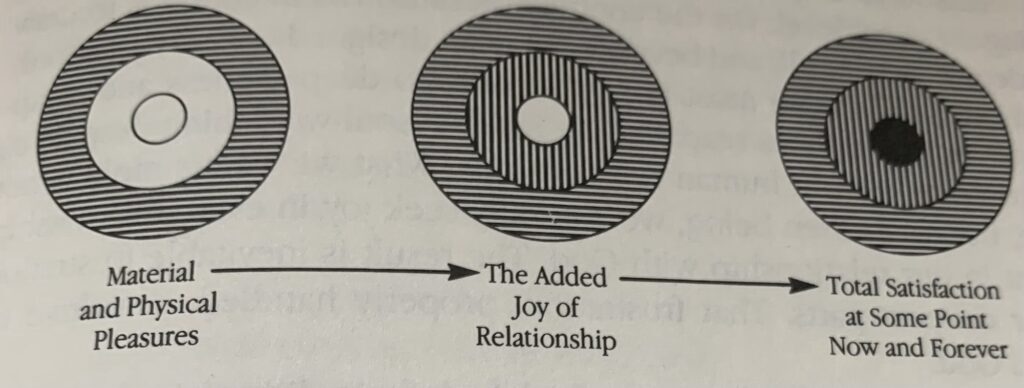Defining the Abundant Life
Most of us like to believe that personal comfort and spiritual commitment define the abundant life Jesus provides. When I am enjoying both personal comfort and spiritual commitment without compromising one or the other, I really do feel pretty good. Is that what springs of living water provide? Most churches project the message – trust God to change whatever makes you uncomfortable while you choose to follow Him. So we sit Sunday after Sunday enjoying the fellowship of others who are comfortable and committed while the broken-hearted and poor press their noses against the window, looking in at us with resentment, envy and despair.
If we are to become a community of deeply changed people, we must not only admit to our thirst, we must carefully explore what Christ promised to do about that thirst. If His promise of springs of living water do not guarantee our personal comfort in exchange for spiritual commitment – and I don’t think they do – then what is He saying? Why do many sincere Christians live lives filled pain? To understand this, we have to study more the longings of our soul.
Three Kinds of Longings
The most profound longings of the human heart, those desires that must be met if life is worth living, can be called crucial longings. We were designed to live in relationship with Someone unfailingly strong and lovingly involved who gives us fulfilment, and without which, life is profoundly empty. No friends, no work, no excitement, no pleasures, nothing can fill that hollow except the kind of relationship that only God offers – since that is how God designed us.
The non-crucial longings can be divided into critical longings and casual longings. We are all aware of desires other than the deep longings that only God can meet, and some of them seem critically important. The legitimate and important desires for quality relationships that add immensely to the joy of living- like the desire to be loved and respected by your partner, the hope that your children will remain close to you and live happy, responsible lives, the longing for friends who know how to be there when you need them can all be termed as Critical longings.
The Casual longings include every other desire we experience on a daily basis- ranging from material comfort to good food and good health or pleasant climate.
If a longing does not involve something which can be only fulfilled in a relationship with another person, then it can be called casual and if it can be met only through relationship with someone, it can be thought of as critical. And if that relational longing is so deep and central that only the resources of God will do, it becomes crucial.
When casual longings are not satisfied, we experience manageable discomfort, although sometimes it can make life very difficult. When that happens I can pull myself together and continue on, sometimes easily, sometimes only with great difficulty.
Frustrations in critical longings are not so easy. When what I do seems unimportant, when people I care don’t care about me, when I suffer the loss of a relationship that deeply mattered, I feel a terrible emptiness within that hurts. Physical pain can sometimes be easier to bear than the anguish of loneliness, rejection or failure. This causes more than manageable discomfort. I feel a deep sorrow, an immobilising lostness that, at least for a time, empties my soul of energy to continue. But time and other experiences seem to help. Not always, but often. The colour comes back into life gradually and there is a return of movement towards life, the capacity to enjoy earlier pleasures and to press on with responsibilities.
But unmet crucial longings is a different matter. I was built for infinite love from Someone who needs nothing in return and whose purposes are supremely important. Only God can supply what my soul most deeply desires. When crucial longings are not satisfied, there is a pain that must be dealt with. Time will not help, other than as an opportunity for denial and escape. Without Someone who cares and something to do that matters, life is an unspeakably cruel experience.
Looking for Fulfilment

We spend our days most clearly aware of our least important longings or casual longings and, as a result, are concerned more with their satisfaction than others. We spend a lot of time and energy in arranging for our comfort, which when goes well, we feel good.
Most of us are in touch with critical longings as well, especially during periods of tension in our relationships. We feel angry and betrayed when spouses are cold, when friends are thoughtless. But when our primary relationships appear to be warm and healthy, we feel quite good and our world is pleasant. We laugh and joke and really feel quite good. If our casual longings remain unmet, we may feel intense discomfort but, at a deeper level, we sense things are okay if our critical longings are satisfied.
A few devoted Christians know what it means to taste the reality of God’s presence when life is crumbling around them. Physical comforts may be few and friends may be insensitive and distant, but Christ somehow moves with sweetness and strength into the depths of their souls. Those are people with the inner circles completely filled.
Fullness in the outer two circles is often mistaken for the inexpressible joy of knowing the Lord. It is entirely normal to fervently wish for fullness in all three circles – pleasant circumstances, strong relationships and communion with God – and that is precisely the Christian’s hope. But the question to be asked is its timing and development.
There are two ideas about the path to joy. One is from outside in.

First God makes us comfortable – in health and wealth. Then, our relationships improve. We enjoy blessing in every area of our life and as fulfilled and happy people we praise God for His goodness. This is a popular view, but one which leads people away from maturity.

The second path of inside out contends that the deepest fullness comes during times of difficult struggle with denied comfort and strained relationships. Knowledge of God develops from the inside out. Until we acknowledge painful disappointment in our circumstances and particularly relationships, we will not pursue Christ with the passion of deep thirst. Or, we rarely learn to meaningfully depend on God when our lives are comfortable. However, the satisfaction of crucial longings does not dull the pain of disappointment when our casual and critical longings go unmet, but helps very much to get us through it without breaking down.
The promise of refreshing spr ings within us guarantee only that, for now, our crucial longings will be met. The satisfaction available now is only a taste. The banquet comes later. We will still ache therefore, for more than what we have. It does not guarantee us pain-free living on every level. There will be frustrations and disappointments. But, we must honestly admit to deep sadness and disappointment, which should drive us towards God. We should not measure the quality of our walk with the Lord by the absence of unhappy feelings. In spite of life’s inevitable pain, it is possible to remain intact no matter what troubles crash into our life, because nothing can rob us of God’s love.
Source: Inside Out by Larry Crabb
< Previous Article

THP Team
The Healing Project Team comprises compassionate individuals who understand the struggles of mental health and faith. We are here to offer support, acceptance and hope through God’s healing plan.

